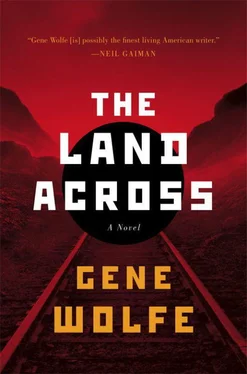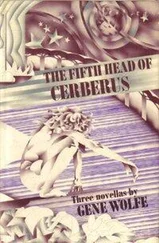If I had thought at all, I would have thought that we would be thrown off the end of the belt and die. It was not like that. Another, wider belt appeared to our right. This new belt was white, and moving slower than the black one. I fell when I tried to step onto it.
The boss border guard helped me up. His dark gray uniform cap had been mashed, and his scarlet-trimmed tunic was more than half-unbuttoned. (I think it was because three or four of the buttons had torn off.) Still he murmured, “Auanactain! Profasis!” like he was sorry I had been hurt. A minute later he helped me onto a red belt. I never did figure him out, only back then I thought maybe I could. My dad used to say foreigners’ values were not the same as ours. Then he would dope them out anyway.
The red belt slowed down, I could feel the wind, and the biggest of the three helped me get off, lifting me like he would have picked up a little kid.
There was a car and a driver waiting for us. The biggest border guard, the boss, and I got into the backseat, with me pinned between them.
The third border guard took the front seat beside the driver. This third border guard was older than the other two. He had a black mustache, and in a lot of ways he looked like my father. Sometimes it seemed to me that the other two did not know he was there the same way I did. He never did talk, and nobody ever talked to him, except me. I did one time.
I asked whether we were going to the capital, at first in English, and then (when I was pretty sure neither of them understood it) in German. “No,” the boss border guard told me in German. “We go to Puraustays.”
I tried to remember a map I had seen. “Puraustays is a long way from the capital.”
“No. It is near.”
“Two hundred kilometers?”
The boss border guard just shrugged, reached into the pocket sewn onto the back of the seat in front of him, and took out a map. He opened it for me.
It was small and looked like it had been drawn for kids, with little pictures scattered here and there. I remember a miner and a wild ox. Looking up from it, I said, “This says three hundred and twenty kilometers.”
The boss border guard chuckled. “All maps are wrong. If the Turks come, they will be lost.”
We crossed a river that may have been the same river my train had roared across the day before. The little map called it the Taxus. Factories lined its bank, ugly gray buildings with tall chimneys of yellow brick. I asked what they made in there. The boss border guard shrugged, but the biggest of the three told me, “Fertilizer.”
The city on the other side of the river was laid out in a way I have never seen anywhere else and had not known they used anywhere. Whether it was a big one or a little one, every building stood on its own block, with narrow streets on all four sides. A lot of these narrow, crooked streets could be called alleys. Some were not even paved. I am going to call them all streets because they use the same word for all of them. The size of the blocks varied depending on the size of the buildings. Large or small, they were mostly square or rectangular. There was always a strip of grass, trees, and shrubs around each building. That seemed to be the law, and it must have been the law there for a long time.
The variations in size meant that our car (and the wagons and so forth) could not go fast, turning left or right almost at the end of each block. Left turns were followed by rights, and the other way. When we had made half a dozen turns or so, it hit me that all the turns must make it hard to follow a particular street. After that, I watched for street signs, but there were not any. Pretty soon I asked the big man the name of the street we were on. He just shrugged and the boss border guard told me, “Our streets do not have names.”
Then I stuck my neck out, saying that no street names must make it hard to find somebody’s house. The boss border guard asked me, “Why do you want to find somebody’s house in Puraustays?”
For a while we threaded our way among old buildings of three, four, or five stories, all of some dark stone. They said the biggest one, with gargoyles and lots of balconies, was the seat of the city’s government. The trees around it were so tall I could not see a thing below a story that could have been the fourth or the third. This story, like the ones above it, was impressive and pretty interesting. I remember plants that looked an awful lot like jellyfish, and people who looked a lot like flowers.
Beyond that was a long yellow brick building with three stories. It was the first building I had seen that looked busy, and it seemed a whole lot busier than just about any building in America, with people hurrying in and out all the time. I asked what it was, and the big guy who had lifted me said, “The Mounted Guard.”
I know I must have looked dumb. There were a lot of big doors, but I had seen no horses and no soldiers. The boss border guard told me, “They are on duty in the East.”
After a while we got into a suburb or something like that. The streets there were more like those in American towns. The houses were all pretty much the same size, and that meant the blocks were pretty much the same size, too. So the streets were nearly straight except when they bent around.
Finally we stopped in front of a house that was not quite as big as the others, a little square house of dirty white concrete blocks. Our driver got out and trotted around to open the door for the third border guard. The sky was overcast, there was not a lot of time, and I could not be sure. But it seemed to me that the driver looked like the porter who had made my bed on the train. They could not have been the same guy. Still, they looked a lot alike.
There was no walk to the front door, only a little path among trees. Except for the driver, we trooped along it, the boss border guard, then the biggest and the third border guard. I limped along behind them, thinking I ought to run away but knowing I would be a darned fool to get separated from my passport. The boss border guard knocked with the barrel of his pistol.
A short, stocky man maybe thirty or so answered it, opening the door a crack then closing it again to unfasten a security chain before opening it wide. He had on a clean gray undershirt and gray wool pants that looked too big.
We crowded in and he talked. I think he was trying to get the boss border guard to sit down in the biggest chair. The boss border guard would not do it and lectured him. After a lot of that, the boss border guard asked me, “In Amerika, you build prisons for your prisoners, yes?” His German was not even as good as mine, but I understood him and nodded.
“Here we save.” The boss border guard chuckled. “You are this man’s prisoner.”
I said I had not done anything.
“You come without visa, with no passport. These things are sufficient.”
“You took my passport,” I reminded him. “Give it back, please.”
“It has been sent to the capital. I cannot give back. Until it is sent back, you have none. You must stay here. You see this man?” The boss border guard indicated the short man in the undershirt. “Do you like him?”
“I don’t know him.”
“So you like him. When you know him better, you do not like him so much, I think.” The boss border guard shut one eye and pointed his pistol at the short man’s head. “When you escape, him we shoot.”
The short man gave me a sad glance.
“You see how nice to you we are. You do not like the food, you say it is rotten, you will go. He give better so you stay. Other things, too.”
I said nothing. I was watching a girl who had peeked around the corner.
“You are to sleep here.” Holstering his pistol, the boss border guard took a folded paper and a pen from a pocket of his uniform jacket and shoved them into the short man’s hand. “Grafote!”
Читать дальше









